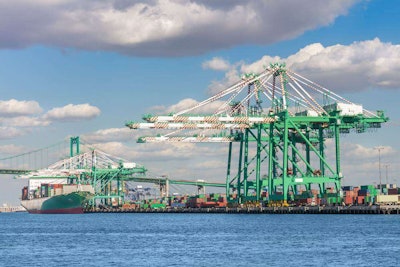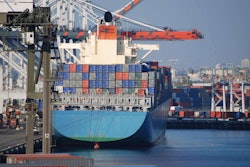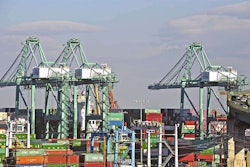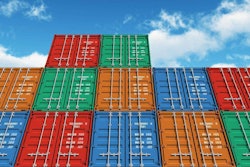 The Port of Los Angeles faced a major cargo backlog earlier this year following months of tense negotiations between port workers and port management companies.
The Port of Los Angeles faced a major cargo backlog earlier this year following months of tense negotiations between port workers and port management companies.The Federal Maritime Commission has released a report on detention and demurrage fees and is seeking documentation on such fees from its carriers and shippers nationwide. The FMC has also approved the Pacific Ports Agreement to allow efforts to reduce West Coast port congestion to continue.
The commission approved the agreement April 15 between the Ocean Carrier Equipment Management Association, the West Coast Marine Terminal Operator Agreement and almost every vessel-operating carrier and marine terminal operator in West Coast ports. Effective April 17, it would permit these parties to discuss and reach agreement on ways to reduce West Coast port congestion.
FMC Chairman Mario Cordero also is encouraging trucking companies and shippers nationwide to submit “substantive documentation” to the commission on unreasonable demurrage or detention practices. Stakeholders also may file complaints for adjudication involving alleged violations of the Shipping Act with the FMC.
“The commission has heard from many importers, exporters and drayage trucking companies complaining about demurrage and detention charges that they must pay even though they cannot timely access their cargo or drop it off before free time expires,” Cordero said.
Free time is the period when no charges are incurred for demurrage (use of space) and detention (use of container), in addition to basic freight costs.
The agency’s staff report on these fees was based on four port congestion forums held last fall and review of tariffs for six vessel-operating common carriers at 32 U.S. terminals. The researchers found average total prices for demurrage and detention may be higher for importers than exporters and for demurrage than detention.
“One shipper has told commission staff that it has paid over $100,000 in demurrage charges in the past year, as compared with paying approximately $10,000 for the previous year,” it states.
“This disparity highlights shippers’ perceptions that demurrage charges are not serving to speed the movement of cargo, the purpose for which those charges had originally been intended. Shippers feel they are in a ‘Catch-22’ when they are not permitted to pick up their container because of congestion, and yet are charged demurrage.”
The FMC will study the issue and hopes the report facilitates stakeholder discussion. It does not recommend any action, but lists possible steps the commission could take that include:
• The imposition of special reporting requirements on filed agreements;
• The initiation of a docketed proceeding for adjudication through an order of investigation;
• The grant of review of a petition with the commission for specific action and
• The initiation of non-adjudicatory fact-finding.











